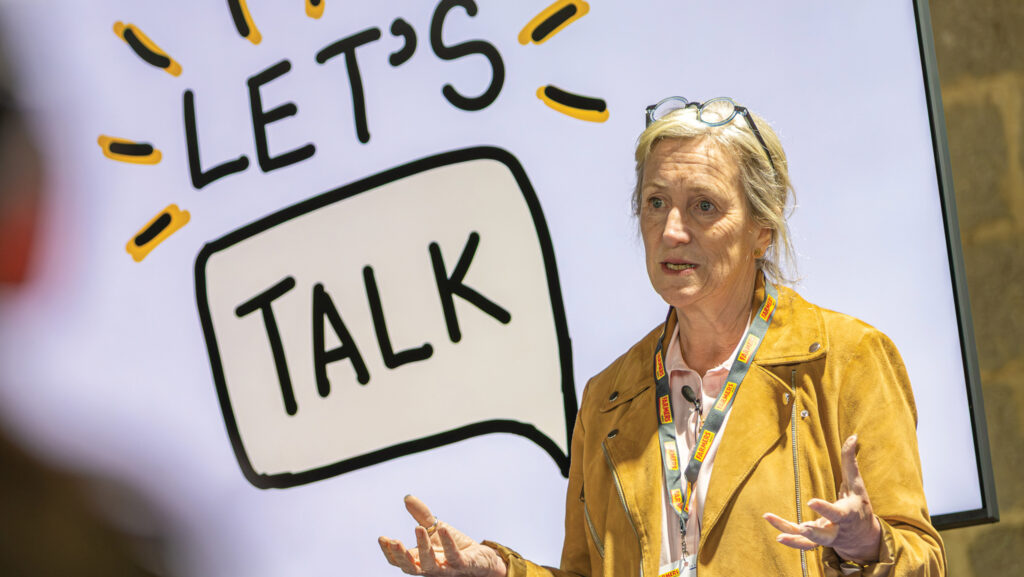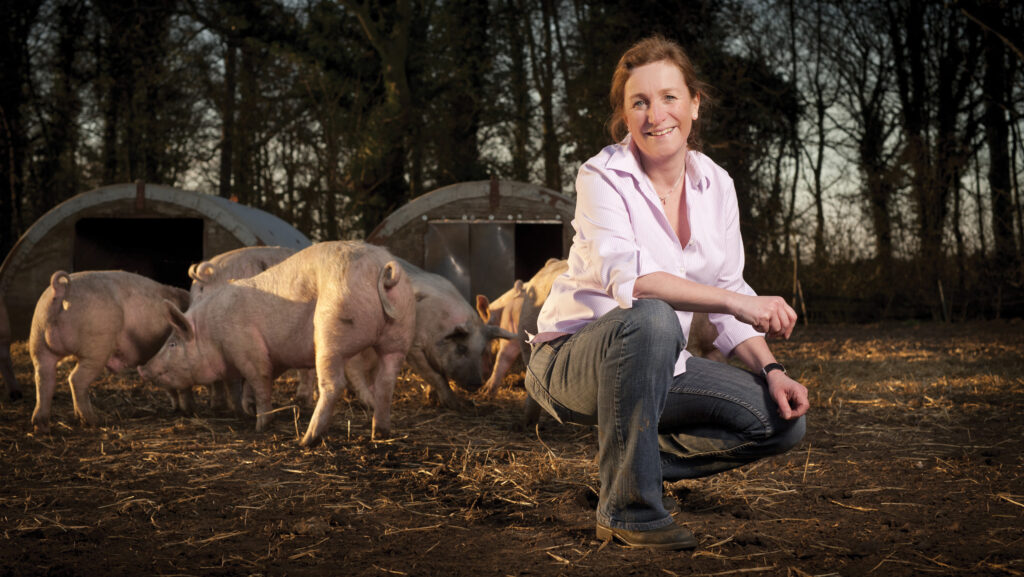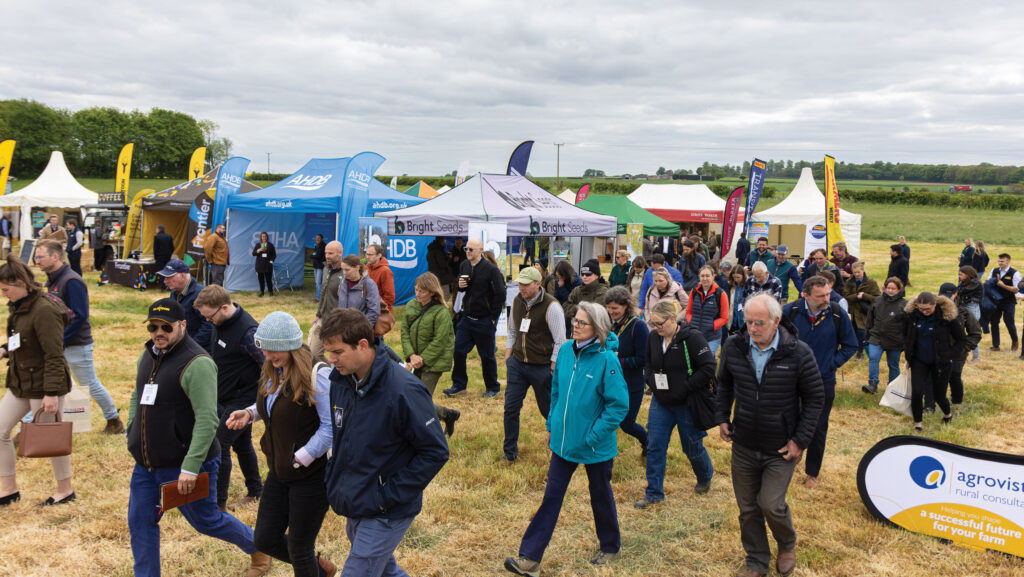Farm futures at risk: Why succession talks can’t wait
 Sally Jackson speaks at Transition Live © MAG/Jamie Hodgskin
Sally Jackson speaks at Transition Live © MAG/Jamie Hodgskin Farm succession has become a hot political issue after chancellor Rachel Reeves’ Autumn Budget revealed plans to cap agricultural property relief at £1m from April 2026.
The change has intensified pressure on farming families to confront one of the sector’s most complex and emotionally charged challenges: who inherits the farm, and how to secure its future across generations.
At Transition Live – hosted by Farmers Weekly at the University of Leeds Farm on 8 May – succession experts urged farmers to plan early, talk openly, and act with clarity.
See also: Transition Farmers: Succession focus and investment on hold
‘Budget is the catalyst’
Richard Taylor, who heads up Strutt & Parker’s farming department in Yorkshire and the North East, said chancellor Reeves’ Budget and the surrounding publicity had triggered more discussions about farm succession.
“It’s the prospect of some tax being needed to be paid that’s driving this,” he said.
Mr Taylor, a farm succession adviser with more than 35 years of experience, said the traditional farm structure – where ownership is retained by parents until death to leverage tax exemptions – no longer holds water.
Instead, the new landscape demands earlier transition of equity and clearer family agreements.
He advised farming families to start by quantifying what they actually own.
“Get a valuation of the assets done. Don’t rely on farm accounts, which may reflect historical purchase values,” said Mr Taylor.
“If the value of the agricultural asset, excluding the farmhouse, exceeds £1m, someone needs to be having a conversation about tax liability and potential restructuring.”
‘Break the silence’
Michael Mack is an independent farm succession coach based in Norfolk who is also chairman of the Succession Alliance, a not-for-profit organisation which focuses on the human side of succession planning.
Mr Mack said the emotional side of succession is just as important – and often the bigger barrier.
“The hardest bit of this jigsaw is that the older generation needs to leave,” he said.
“They need to build trust that the younger generation can take the business forward.
“Statistically, younger-run farms are more profitable, adopt newer technology and environmental techniques. We know these things will happen and we’ve got to get that change.”
Mr Mack said reluctance to initiate “that conversation” only delays and worsens any conflict.
But he advised younger family members to ask: “What do you see the farm looking like in 15 years?” This is a gentler, more constructive question than simply asking to take over.
Set expectations in writing
One of Mr Taylor’s key messages was the need to formalise family expectations.
“We can’t drift into assumptions like, ‘Mum and Dad promised me the farm’. That only leads to conflict if things don’t go as expected,” he said.
He advised families to document intentions clearly, noting that too many farms still lack proper agreements or clarity over ownership.
Legal structures must reflect both tax realities and family goals, he said.
Jennie Wheildon, a solicitor at law firm Shakespeare Martineau, based in Warwick, spoke about the importance of having a clear vision for the future of the farming business.
“The key question is: where is your business going, and who is part of that future? Succession isn’t about next year, it’s about long-term vision. These are conversations that need to happen over time, not rushed fixes.”
‘Don’t let the tax tail wag the dog’
Ms Wheildon urged farmers to start preparing for succession now by putting wills and powers of attorney in place, and consider any potential tax exemptions.
“You need to prepare now, as none of us has a crystal ball,” she said.
She warned against letting panic over tax changes drive rushed decisions.
“Yes, tax is what’s prompting people to pick up the phone. But the bigger question is: what do you want from the next generation? Where is this business going?”
While acknowledging the distress caused by the new £1m inheritance tax (IHT) threshold, which is leading some farmers to consider “drastic actions”, she offered reassurance.
“It can be done in bite-size chunks. Take baby steps. Don’t do it alone.”
Sally Jackson, a farmer’s wife from Lincolnshire, shared her real-world experience of trying to nudge her husband Andrew into succession planning after their daughter Anna returned to the business during Covid (see panel).
“He’s never going to retire! But it was about gradually letting go. Illness, an accident – anything can be a catalyst [for succession talks],” she said.
She said Anna told her father she didn’t want to “challenge the old lion”, but to “gradually take the load off”.
That mindset, said Mr Mack, is key. “It takes 10-15 years to truly embed the next generation into the business,” he explained.
Fair versus equal
What does “fair” look like in a world where land is now worth more than £13,000/acre, one delegate asked.
For example, one child may have worked the farm for 20 years while another left for a city career.
“Fair might not be equal,” said Ms Wheildon. “That’s something you need to grapple with as a family, preferably before you write the will.”
Clawback clauses, carve-outs, and pre-agreed equity shifts are all options.
And many farms are exploring new structures, such as bringing children into partnerships now, or establishing family investment companies to begin the seven-year gifting process.
However, Mr Taylor cautioned that trusts can backfire.
“Some of the 10-year tax charges on trusts are absolutely horrendous. Do your homework,” he said.
Mental health support
With increased financial pressure and family tension, mental health can suffer too.
The panel urged farmers to reach out, join discussion groups on IHT, and make use of farming charities such as the Royal Agricultural Benevolent Institution and the Farming Community Network.
“This is a scary time,” said Mr Mack. “We know a lot of farmers struggle with mental health. Talk to others. Get off the farm. Know you’re not alone.”
Mr Taylor added: “Every farmer has an accountant. If you’re worried, meet with them – don’t just send them your books. If they’re the only adviser you trust, they can help bring in others to support you.”
Time to talk is now
Succession planning is never easy, but it’s now unavoidable.
As Mr Mack put it: “What’s really bad in farming is farmers leaving their best mate to tell their kids what they are not going to get in their will.
“I think we’ve got to break that cycle and get talking about it as a family.
“If I’m going to dedicate my life to running that business, I need to know the security of that business. I don’t want to be surprised later on.”
Sally Jackson: ‘Talk, talk, talk to your children’

Sally Jackson © Jim Varney
For Sally Jackson of The Pink Pig Farm near Scunthorpe, tackling farm inheritance was long overdue.
When daughter Anna, 32, returned to their 324ha regenerative farm after Covid – and with tensions growing between generations – Sally knew it was time to talk.
“I jokingly called it, ‘How to stop your daughter killing your husband’,” she said.
The family held a “Let’s Talk” meeting, with simplified accounts and long-term plans shared.
“You assume kids understand the business, but they don’t,” said Sally.
The chat revealed differing levels of interest: one child was keen, the other two less so.
“None want my business, so I’m looking at a son-in-law instead,” she added.
Mrs Jackson urged others to start succession conversations early.
“If my husband Andrew farms 20 more years, Anna will be 55 before she gets a say. That’s not right. Trust the younger generation. Talk about the tough stuff – death, taxes, wills. Just talk.”
What else was going on at Transition Live?
The second annual Transition Live event, was hosted by Farmers Weekly at the University of Leeds Farm on 8 May 2025.
It brought together farmers, policymakers, and industry experts to explore the major challenges and opportunities shaping the future of UK agriculture.
Centred on three key themes – food production, environmental sustainability, and farm business optimisation – the event featured panel discussions, practical advice, and lively audience Q&As.
Sessions tackled pressing issues such as upland farming with Nic Renison, integrating trees and livestock through silvopasture, and the economic realities of on-farm renewable energy, including solar and wind.
Diversification was a strong focus, with farmer Maria Benjamin sharing how she and her partner John Atkinson built thriving brands from their sheep’s wool and handmade soap from their Jersey cow’s milk on their Lake District farm.
New for 2025, the Innovation Hub showcased cutting-edge agri-tech and promoted collaboration between farmers and researchers.
Farm tours also gave attendees first-hand insight into regenerative practices and sustainable land management.

© Jamie Hodgskin
Now entering its fifth year, the Farmers Weekly Transition project is designed to help farmers navigate major shifts in policy, markets, the environment, and global politics – empowering them to build resilience and long-term business viability.
“Transition is about change management and seizing opportunities,” said Farmers Weekly Transition project editor Johann Tasker.
“With challenge comes the chance to build a sustainable, resilient future for UK farming.”
See all our Transition content at fwi.co.uk/transition.
